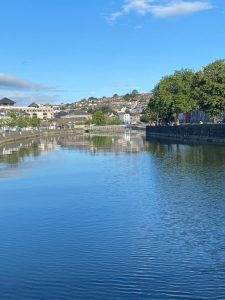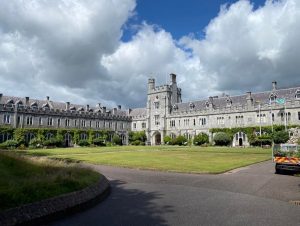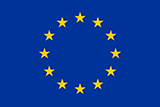Ever since I was a teenager, I knew science was going to be my life partner. I remember myself being intrigued by biological phenomena and diseases and researching about them (the outbreak of Influenza virus back then certainly played a role). I would always ask myself, even at that young age, why antibodies act the way they do, why some bacteria and humans have a symbiotic relationship, how drugs are made and how they are designed to act specifically at one target. As I was growing more and more curious year after year, my passion for science was also growing.
Going back to 2016-2017, I believed that the hottest research topics were cancer implications and treatment. I was surprised when I was looking at the statistics and found out that colon cancer is one of the most lethal types with a low treatment rate. I started digging deeper into the morphology, the physiochemical characteristics, and the biology of the gastrointestinal (GI) tract with a greater focus on the colon. All findings would generate more questions. One of the questions raised was how a drug can be formulated in such a way that it will penetrate all the barriers of the GI tract and reach the colon to act there? Looking back at my biochemistry courses, I happened to notice the presence of microorganisms (microbiota) present across the intestines, with a higher abundance in the colon. I asked myself, could this be a missing link? Is the role of microbiota to be accounted for in colonic drug delivery?
Fast forward to fall of 2020, during another virus outbreak (oh, the irony), when I was looking to start a PhD. I happened to come across COLOTAN and the minute I saw an Ireland-based project containing the word microbiota, I knew this was a sign that I had to follow. After a friendly talk with some people (spoiler alert: they would become my future supervisors), I was fascinated by the potential of this project. I spent the next month tailoring my CV and motivational letter, practising interview questions, giving a presentation, and counting down the days until a decision had been made. I got the well-anticipated email starting with the word: Congratulations. I was ready to embark on a new journey.

Coming from a different background, I had to study, reading books and literature around drug design and targeting. I had to catch up with my fellow early stage researchers (most of them are pharmacists) and understand key concepts of pharmaceutics. This is still a work in progress, but I believe I am doing quite well so far.
Arriving in Cork, Ireland mid-summertime from Athens was not hard at all when I saw how beautiful this country is. Nice people and tasty food played an important role in facilitating my transition to this country. There are multiple food markets to explore and little cafes to relax in. I’ve always loved towns that are on a river, and let me tell you, Cork does not disappoint. However, the real struggle came while I was trying to understand the rules of hurling (an Irish-played sport), I am still not sure if I understand them correctly.

When I got to know my supervisors at the University College Cork, I felt like I was part of a great group. This feeling rings true each and every day. Getting deeper and deeper into the project and designing experiments, I can now see how all the sciences somehow overlap with each other. At the same time, there are unanswered questions regarding both the biology (microbiota, implications in diseases) and pharmaceutics (drug delivery and design). My work has only just begun.
Theodoros Giakoumis
PS: A trip to Kerry county is a must, should anyone ever decide to visit Ireland.
(Images: Cork)


